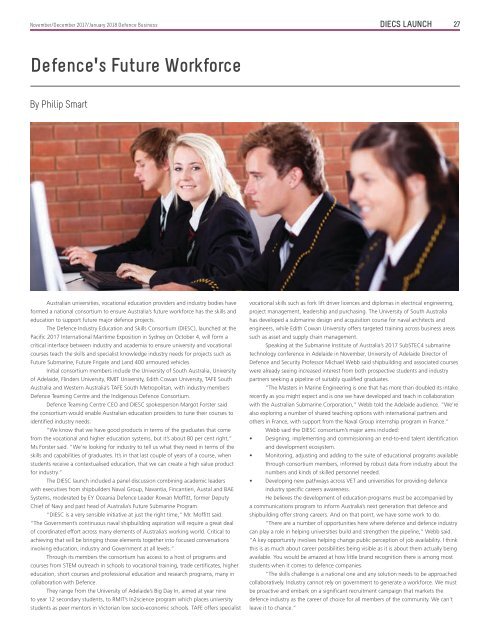Defence Business_Issue 41 (Nov 17 – Jan 18)_DTC_Web
Create successful ePaper yourself
Turn your PDF publications into a flip-book with our unique Google optimized e-Paper software.
<strong>Nov</strong>ember/December 20<strong>17</strong>/<strong>Jan</strong>uary 20<strong>18</strong> <strong>Defence</strong> <strong>Business</strong><br />
DIECS LAUNCH<br />
27<br />
<strong>Defence</strong>'s Future Workforce<br />
By Philip Smart<br />
Australian universities, vocational education providers and industry bodies have<br />
formed a national consortium to ensure Australia’s future workforce has the skills and<br />
education to support future major defence projects.<br />
The <strong>Defence</strong> Industry Education and Skills Consortium (DIESC), launched at the<br />
Pacific 20<strong>17</strong> International Maritime Exposition in Sydney on October 4, will form a<br />
critical interface between industry and academia to ensure university and vocational<br />
courses teach the skills and specialist knowledge industry needs for projects such as<br />
Future Submarine, Future Frigate and Land 400 armoured vehicles.<br />
Initial consortium members include the University of South Australia, University<br />
of Adelaide, Flinders University, RMIT University, Edith Cowan University, TAFE South<br />
Australia and Western Australia’s TAFE South Metropolitan, with industry members<br />
<strong>Defence</strong> Teaming Centre and the Indigenous <strong>Defence</strong> Consortium.<br />
<strong>Defence</strong> Teaming Centre CEO and DIESC spokesperson Margot Forster said<br />
the consortium would enable Australian education providers to tune their courses to<br />
identified industry needs.<br />
“We know that we have good products in terms of the graduates that come<br />
from the vocational and higher education systems, but it’s about 80 per cent right,”<br />
Ms Forster said. “We’re looking for industry to tell us what they need in terms of the<br />
skills and capabilities of graduates. It’s in that last couple of years of a course, when<br />
students receive a contextualised education, that we can create a high value product<br />
for industry.”<br />
The DIESC launch included a panel discussion combining academic leaders<br />
with executives from shipbuilders Naval Group, Navantia, Fincantieri, Austal and BAE<br />
Systems, moderated by EY Oceania <strong>Defence</strong> Leader Rowan Moffitt, former Deputy<br />
Chief of Navy and past head of Australia’s Future Submarine Program.<br />
“DIESC is a very sensible initiative at just the right time,” Mr. Moffitt said.<br />
“The Government’s continuous naval shipbuilding aspiration will require a great deal<br />
of coordinated effort across many elements of Australia’s working world. Critical to<br />
achieving that will be bringing those elements together into focused conversations<br />
involving education, industry and Government at all levels.”<br />
Through its members the consortium has access to a host of programs and<br />
courses from STEM outreach in schools to vocational training, trade certificates, higher<br />
education, short courses and professional education and research programs, many in<br />
collaboration with <strong>Defence</strong>.<br />
They range from the University of Adelaide’s Big Day In, aimed at year nine<br />
to year 12 secondary students, to RMIT’s In2science program which places university<br />
students as peer mentors in Victorian low socio-economic schools. TAFE offers specialist<br />
vocational skills such as fork lift driver licences and diplomas in electrical engineering,<br />
project management, leadership and purchasing. The University of South Australia<br />
has developed a submarine design and acquisition course for naval architects and<br />
engineers, while Edith Cowan University offers targeted training across business areas<br />
such as asset and supply chain management.<br />
Speaking at the Submarine Institute of Australia’s 20<strong>17</strong> SubSTEC4 submarine<br />
technology conference in Adelaide in <strong>Nov</strong>ember, University of Adelaide Director of<br />
<strong>Defence</strong> and Security Professor Michael <strong>Web</strong>b said shipbuilding and associated courses<br />
were already seeing increased interest from both prospective students and industry<br />
partners seeking a pipeline of suitably qualified graduates.<br />
“The Masters in Marine Engineering is one that has more than doubled its intake<br />
recently as you might expect and is one we have developed and teach in collaboration<br />
with the Australian Submarine Corporation,” <strong>Web</strong>b told the Adelaide audience. “We’re<br />
also exploring a number of shared teaching options with international partners and<br />
others in France, with support from the Naval Group internship program in France.”<br />
<strong>Web</strong>b said the DIESC consortium’s major aims included:<br />
• Designing, implementing and commissioning an end-to-end talent identification<br />
and development ecosystem.<br />
• Monitoring, adjusting and adding to the suite of educational programs available<br />
through consortium members, informed by robust data from industry about the<br />
numbers and kinds of skilled personnel needed.<br />
• Developing new pathways across VET and universities for providing defence<br />
industry specific careers awareness.<br />
He believes the development of education programs must be accompanied by<br />
a communications program to inform Australia’s next generation that defence and<br />
shipbuilding offer strong careers. And on that point, we have some work to do.<br />
“There are a number of opportunities here where defence and defence industry<br />
can play a role in helping universities build and strengthen the pipeline,” <strong>Web</strong>b said.<br />
“A key opportunity involves helping change public perception of job availability. I think<br />
this is as much about career possibilities being visible as it is about them actually being<br />
available. You would be amazed at how little brand recognition there is among most<br />
students when it comes to defence companies.<br />
“The skills challenge is a national one and any solution needs to be approached<br />
collaboratively. Industry cannot rely on government to generate a workforce. We must<br />
be proactive and embark on a significant recruitment campaign that markets the<br />
defence industry as the career of choice for all members of the community. We can’t<br />
leave it to chance.”


















